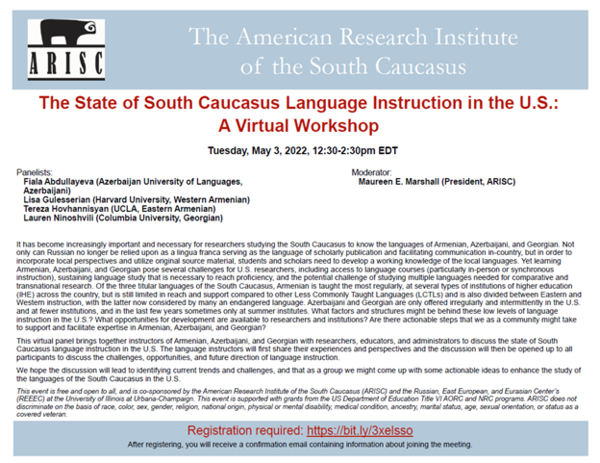
The State of South Caucasus Language Instruction in the U.S.: A Virtual Workshop
- Event Type
- Seminar/Symposium
- Sponsor
- American Research Institute of the South Caucasus (ARISC) and the Russian, East European, and Eurasian Center’s (REEEC)
- Date
- May 3, 2022 11:30 am - 1:30 pm
- Registration
- Registration
- Views
- 60
- Originating Calendar
- Russian, E. European & Eurasian Center: Co-sponsored Events
Panelists:
Fiala Abdullayeva (Azerbaijan University of Languages, Azerbaijani)
Lisa Gulesserian (Harvard University, Western Armenian)
Tereza Hovhannisyan (UCLA, Eastern Armenian)
Lauren Ninoshvili (Columbia University, Georgian)Moderator:
Maureen E. Marshall (President, ARISC)It has become increasingly important and necessary for researchers studying the South Caucasus to know the languages of Armenian, Azerbaijani, and Georgian. Not only can Russian no longer be relied upon as a lingua franca serving as the language of scholarly publication and facilitating communication in-country, but in order to incorporate local perspectives and utilize original source material, students and scholars need to develop a working knowledge of the local languages. Yet learning Armenian, Azerbaijani, and Georgian pose several challenges for U.S. researchers, including access to language courses (particularly in-person or synchronous instruction), sustaining language study that is necessary to reach proficiency, and the potential challenge of studying multiple languages needed for comparative and transnational research. Of the three titular languages of the South Caucasus, Armenian is taught the most regularly, at several types of institutions of higher education (IHE) across the country, but is still limited in reach and support compared to other Less Commonly Taught Languages (LCTLs) and is also divided between Eastern and Western instruction, with the latter now considered by many an endangered language. Azerbaijani and Georgian are only offered irregularly and intermittently in the U.S. and at fewer institutions, and in the last few years sometimes only at summer institutes. What factors and structures might be behind these low levels of language instruction in the U.S.? What opportunities for development are available to researchers and institutions? Are there actionable steps that we as a community might take to support and facilitate expertise in Armenian, Azerbaijani, and Georgian?
This virtual panel brings together instructors of Armenian, Azerbaijani, and Georgian with researchers, educators, and administrators to discuss the state of South Caucasus language instruction in the U.S. The language instructors will first share their experiences and perspectives and the discussion will then be opened up to all participants to discuss the challenges, opportunities, and future direction of language instruction.
We hope the discussion will lead to identifying current trends and challenges, and that as a group we might come up with some actionable ideas to enhance the study of the languages of the South Caucasus in the U.S.
This event is free and open to all and is co-sponsored by the American Research Institute of the South Caucasus (ARISC) and the Russian, East European, and Eurasian Center’s (REEEC) at the University of Illinois at Urbana-Champaign. This event is supported with grants from the US Department of Education Title VI AORC and NRC programs.
ARISC does not discriminate on the basis of race, color, sex, gender, religion, national origin, physical or mental disability, medical condition, ancestry, marital status, age, sexual orientation, or status as a covered veteran.